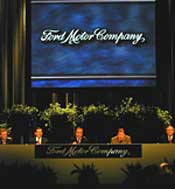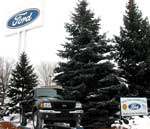Ford Officials Reassure Local Workers
By Andrew Haeg
Minnesota Public Radio
May 10, 2001
Ford Motor Co. executives and shareholders are in St. Paul for the company's annual meeting. CEO Jacques Nasser and Chairman William Ford addressed a range of challenges facing the company, from improving environmental standards to raising the fuel efficiency of Ford vehicles. They also reiterated a commitment not to close the company's St. Paul facility in the next few years.
UNION LEADERS AND WORKERS AT THE ST. PAUL FORD PLANT
have worried the company might close the facility when it unveils a new version of its main product, the Ranger pickup truck. But Chairman William Ford told Gov. Ventura Wednesday that Ford won't close the plant anytime soon. Even so, Joe Blandino of St. Paul asked company CEO Jacques Nasser if rumors of the plant's demise had any merit.
"There are no guarantees. What we can say is that the Ranger product is doing very well in your plant, and the plant is doing a superb job," said Nasser. "At least through 2005, that plant is part of our product range. Beyond that we haven't made any decisions."
Nasser added that if workers at the Ford plant want to strengthen their case, they'll have to remain competitive in quality, consumer satisfaction and productivity. Union officials say the plant's future could also rest on workers' ability to implement a new management system which gives more power to hourly employees.
"What they tell us is that that could be the most important factor," says Rob McKenzie, president of United Auto Workers Local 879, which represents most of the plant's workers. "I think that would definitely have a bearing on what plants are given new models and which aren't."
Shareholders in town for the meeting took the rare opportunity of an open forum with Ford's leaders to raise a wide range of issues. Among them was Ford's commitment to environmental principles. The company recently pledged to work to counteract global climate change. One shareholder from Cambridge, Mass. asked Chairman William Ford if that was just public relations.
"We are committed to being a leader in the global climate change issue," said Ford. "It's a delicate balance between the current demands of the marketplace and the long-term demands of society. But I think we're well positioned to be the leader on this.
The fact remains that Ford is the number one maker of sport utility vehicles, which are some of the least fuel efficient but most popular vehicles on the road. The company continues to pledge a 25 percent improvement in the fuel efficiency of its SUVs by 2005.
Jacques Nasser agreed the company must become more environmentally sensitive, but says it can't ignore consumer demand.
"The interesting thing, is if you look at the split between cars and trucks, it really hasn't changed that much. If anything, SUVs are at higher levels than most people anticipated. But part of that is the makeup of sports utility vehicles have changed," says Nasser.
Now auto makers, especially in Japan, are rolling out hybrid gas-electric SUVs. And Ford is following suit. It's rolling out the Escape, which is smaller than normal SUVs, and runs on both gas and electricity.
This meeting marked the first time Ford executives faced shareholders in person since last year's debacle over the Firestone tire recall. Close to 200 deaths have been attributed to the flawed tires. Shareholders didn't raise the subject, but, after the meeting, Nasser said the company remains vigilant about the tires.
"Who knows if it's all over. We said when we recalled those tires that we will continue to monitor all of the tire data that's available to us. Believe me, we know it's an important item on our agenda. And we think about it all of the time," Nasser said.
Ford brought the annual meeting to St. Paul to make it more accessible for its many Midwestern shareholders. One of them is Ben Yagatich, who drove to St. Paul from his home in Seven Hills, Ohio. Yagatich says he's happy with the company - the stock's up 20 percent this year, despite a 50 percent profit decline in the first quarter, compared to last year. And despite the lingering effects of the Firestone tire disaster.
"I think they did run through that tough patch pretty well. I don't know that they could have done any better," says Yagatich.
Nasser and Ford agreed the company is in good shape, despite all the pressure. But Nasser reminded shareholders that the economy remains weak, and may get weaker.
By Andrew Haeg
Minnesota Public Radio
May 10, 2001
|
|
RealAudio |
Ford Motor Co. executives and shareholders are in St. Paul for the company's annual meeting. CEO Jacques Nasser and Chairman William Ford addressed a range of challenges facing the company, from improving environmental standards to raising the fuel efficiency of Ford vehicles. They also reiterated a commitment not to close the company's St. Paul facility in the next few years.
| |
|
|
|
||
"There are no guarantees. What we can say is that the Ranger product is doing very well in your plant, and the plant is doing a superb job," said Nasser. "At least through 2005, that plant is part of our product range. Beyond that we haven't made any decisions."
Nasser added that if workers at the Ford plant want to strengthen their case, they'll have to remain competitive in quality, consumer satisfaction and productivity. Union officials say the plant's future could also rest on workers' ability to implement a new management system which gives more power to hourly employees.
"What they tell us is that that could be the most important factor," says Rob McKenzie, president of United Auto Workers Local 879, which represents most of the plant's workers. "I think that would definitely have a bearing on what plants are given new models and which aren't."
Shareholders in town for the meeting took the rare opportunity of an open forum with Ford's leaders to raise a wide range of issues. Among them was Ford's commitment to environmental principles. The company recently pledged to work to counteract global climate change. One shareholder from Cambridge, Mass. asked Chairman William Ford if that was just public relations.
"We are committed to being a leader in the global climate change issue," said Ford. "It's a delicate balance between the current demands of the marketplace and the long-term demands of society. But I think we're well positioned to be the leader on this.
| |
|
|
|
||
"The interesting thing, is if you look at the split between cars and trucks, it really hasn't changed that much. If anything, SUVs are at higher levels than most people anticipated. But part of that is the makeup of sports utility vehicles have changed," says Nasser.
Now auto makers, especially in Japan, are rolling out hybrid gas-electric SUVs. And Ford is following suit. It's rolling out the Escape, which is smaller than normal SUVs, and runs on both gas and electricity.
This meeting marked the first time Ford executives faced shareholders in person since last year's debacle over the Firestone tire recall. Close to 200 deaths have been attributed to the flawed tires. Shareholders didn't raise the subject, but, after the meeting, Nasser said the company remains vigilant about the tires.
"Who knows if it's all over. We said when we recalled those tires that we will continue to monitor all of the tire data that's available to us. Believe me, we know it's an important item on our agenda. And we think about it all of the time," Nasser said.
Ford brought the annual meeting to St. Paul to make it more accessible for its many Midwestern shareholders. One of them is Ben Yagatich, who drove to St. Paul from his home in Seven Hills, Ohio. Yagatich says he's happy with the company - the stock's up 20 percent this year, despite a 50 percent profit decline in the first quarter, compared to last year. And despite the lingering effects of the Firestone tire disaster.
"I think they did run through that tough patch pretty well. I don't know that they could have done any better," says Yagatich.
Nasser and Ford agreed the company is in good shape, despite all the pressure. But Nasser reminded shareholders that the economy remains weak, and may get weaker.


